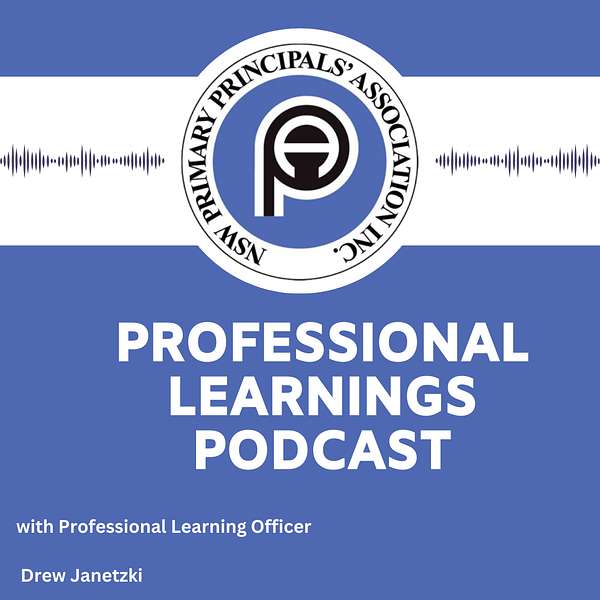
Professional Learnings NSWPPA Educational Leadership
Professional Learnings for Educational Leaders is an initiative to support and inform NSWPPA members of the NSWPPA Professional Learning suite offerings.
Our Professional Learning Suite is aligned to our values of Principal Well Being, Principals as Lead Learners as well as supporting Principals to lead School Operations.
Our values are wrapped around support, empower, advovate and lead.
This podcast discusses educational leadership and insights from Educational Leaders around the world .
Our courses and Professional learning include the following world class programs that support educational leadership
| Art of Leadership
| Art of Leadership MasterClass
| Middle Leadership Imperative
| Mitch Wallis REAL Conversations
| TAO of Teams with Rob Stones
| Performance and Coaching Conversations with Rob Stones
| AMP Series
| The Anxiety Project
| Tough Conversations with Michael Hawton
| CLARITY Learning Suite
| CLARITY Learning Suite support group
| CLARITY Learning Suite coaching support
| The Flourish Movement for School Leaders
| The Flourish Movement for Schools
| FRANKLIN COVEY
| 7 Habits of Highly Effective People
| Speed of Trust
| Multipliers
| 4 Essential Roles of Leadership
| Priority Management
| Working Sm@rt with Outlook
| Working Sm@rt with TEAMS
| Working Sm@rt with Notebook
| Working Sm@rt with Microsoft Bookings
| Working Sm@rt with Excel
| Working Sm@rt with MS Power BI
| Working Sm@rt with PowerPoint
| Working Sm@rt with MS Word
| Working Sm@rt with Project Planning Breakthroughs
| Working Sm@rt with Fundamentals of MS Projects
The New South Wales Primary Principals’ Association is committed to supporting and empowering principals to effectively lead and manage school communities from a diverse range of contexts. The Association responds to and supports school leaders as they address different challenges in rural, remote and metropolitan schools. Further information about our Professional Learning can be found at:https://www.nswppa.org.au/professional-learning
Professional Learnings NSWPPA Educational Leadership
Breaking the Postcode Barrier: How Early Career Education Transforms Lives
From the moment children develop basic motor skills, they begin role-playing the futures they can imagine. But by upper primary school, these dreams often narrow dramatically - limited by postcodes, stereotypes, and what they see in their immediate environment. What if we could change this pattern?
Liv Penny, co-founder and CEO of Become Education, is transforming how we prepare young people for their futures. Her journey began with a profound observation: watching smart, happy classmates take dramatically different paths based solely on where they lived. This sparked a mission to ensure all children could write their stories "from the inside out" rather than having their futures determined by external circumstances.
The evidence is compelling. OECD research shows 50% of students globally aspire to just 10 occupations, with even narrower patterns at the local level. Meanwhile, 80% of 10-13 year olds think about their futures weekly, yet less than 10% say a teacher knows their aspirations. We're missing a massive opportunity to tap into natural motivation.
Become Education's approach doesn't prematurely force career decisions but instead develops the skills to explore broadly and design meaningful future pathways. Schools implementing the program report remarkable outcomes - from a 205% increase in students feeling their school cares about their future to transformative stories of previously disengaged students finding purpose and hope.
One particularly powerful story involves a disengaged student with dyslexia who discovered animation as her "happy place" through the program. With newfound purpose, she crafted a beautiful email to a Disney animator who responded with encouragement and professional advice. "She was transformed," her teachers reported through tears. "She never spoke and now she has transformed."
The impact extends beyond career readiness to improved engagement across all learning areas. As PISA data confirms, students who connect current learning to future possibilities show improvement in all learning strategies. In a world of AI and rapid change, this approach develops the uniquely human capabilities - curiosity, creativity, agency - that will remain valuable regardless of technological shifts.
Ready to help your students design futures full of possibility? Visit the Become Education website to learn how your school or cluster can implement this powerful, evidence-based approach.
Links and References:
To view our Professional Learning Offerings, visit:
https://www.nswppa.org.au/professional-learning
To view our latest offerings, visit: https://www.nswppa.org.au/catalogue
